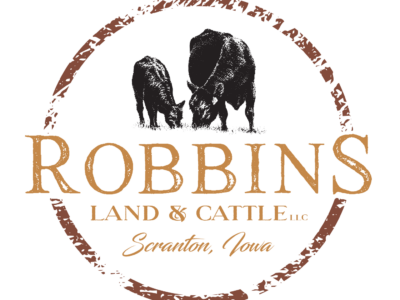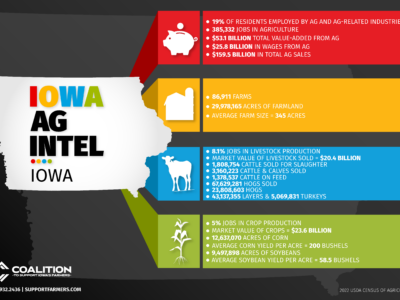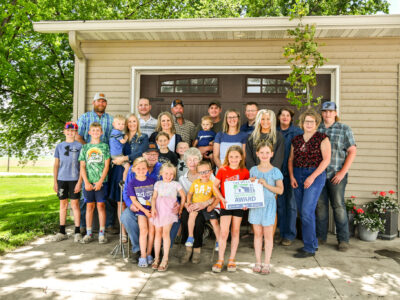Coalition helps livestock farmers grow the right way
05-02-2012 in Livestock
By: Bethany Pint, Iowa Farm Bureau Spokesman
When Farm Bureau members and Boone County farmers Eric and Emily Crosman were looking to build a hog barn on their Century Farm site near Ogden, they knew they wanted to talk with their neighbors first, but they needed some help. The Crosmans called the Coalition to Support Iowa’s Farmers (CSIF), a non-profit, non-partisan organization that provides assistance to farmers at no cost, for that help.
Eric said he had heard about CSIF through its radio ads, but also knew Kent Mowrer, a CSIF field specialist.
The couple said the goal of the barn was to get their livestock closer to home. They had pigs in four different counties, and between jobs and their two children, it was getting difficult to juggle. “I’ve always wanted to live where we had livestock,” Eric said.
So they approached CSIF in late August 2011 to get the ball rolling. In September, Mowrer visited with the Crosmans to discuss the rules and regulations that would apply to their hog barn site as well as a communication plan to help the Crosmans talk to their neighbors.
Emily said she had concerns in the beginning about what impact the hog barn would have on their neighbors. “My main concern was the potential for odor issues,” Emily said. “I wanted to be sure we weren’t going to negatively impact our neighbors.”
“Emily had a lot of concerns and her concerns were very similar to what neighbor concerns could be, and so she needed to communicate to them why she felt that it was workable to have the livestock barn that close to her family’s home,” Mowrer said.
Using a siting model
A part of the process was looking at Iowa State’s Community Assessment Model (CAM) to understand how wind patterns move odor away from the site and how that may affect both the Crosmans as well as their neighbors. After helping the Crosmans site the location for a barn and understand the rules and regulations, Mowrer helped the Crosmans in their plans to talk with their neighbors.
“I helped them put a communication plan together so they could effectively communicate their plans for their expansion for their farm,” Mowrer said. “It’s not only Eric that needed to communicate that, it was also Emily; it needed to be the whole family to make it meaningful to the neighbors and to help them understand why they want to grow their farm.”
Eric and Emily starting meeting face-to-face with their neighbors after the first of the year, after they knew they could get the financing for the project. They made sure to include all of their neighbors, which meant sending a letter to neighbors who were living in Arkansas during the winter.
Discussing plans with neighbors isn’t listed under any rule or regulation, but it’s important, Mowrer said. “It’s important for farmers to visit with neighbors about the expansion of their livestock farms to tell their story,” he said. “Because if they don’t take the opportunity to tell their story, then neighbors will tell their stories in a coffee shop and the gossip circle, and usually it’s wrong.”
The right thing to do
He said it’s important to talk about why the family is expanding or building a site and why it’s important to the family, how they plan to take care of the animals on the site, how they plan to handle manure and the ways in which the family plans to protect the quality of life for their family as well as their neighbors.
So why go through the step of talking to neighbors? “It’s just the right thing to do,” Emily said.
“I wanted to get their input on how we build this barn,” Eric said. “Because I’m planning on living here until the day I retire and hopefully my boys take over, and I’m hoping my neighbors do the same thing; they stick around. I don’t want to run anybody off, because it’s just not worth it.”
Eric and Emily ultimately decided they would raise hogs in a wean-to-finish barn and grow pigs for Cargill. They broke ground on April 10 and plan to have their first batch of pigs in mid-June. The state-of-the-art building will house 2,480 head of pigs in a tunnel type of system.
They plan to plant trees around the hog barn to help reduce odor, improve site aesthetics and serve as a windbreak for the farm. They’ll do that through the Green Farmstead Partner Program, a partnership between CSIF, Iowa Nursery and Landscape Association and Trees Forever.
The Crosmans said they’ve learned a lot about the process.
“I think that helps tell our story better, and it’s easier for us to educate our neighbors with what’s going on,” Emily said. “I think that’s part of the problem why some people don’t like what’s going on with hogs. They get a bad rap because I just don’t think (people) know; they don’t have the correct information.”
CSIF can be reached by calling 1-800-932-2436 or at www.supportfarmers.com.
Recommended News

Robbins Family Hosts Cattle Building Open House
Farmers interested in learning about the benefits of raising cattle under roof are invited to attend an open house at the Robbins family farm to tour Justin and Lacie Robbins...
Read More
NEW STUDY SHOWS IOWA AGRICULTURE EVEN STRONGER
Iowa’s 86,911 family farms continue to be a key driver of Iowa’s economy, contributing 32 percent more to the state economy than in 2017, according to a new study commissioned...
Read More
Farming is a Family Affair
The Streit family of West Bend, Iowa, has cultivated their farm for over three decades, fostering a legacy of hard work and community support. Diane and Tony Streit, alongside their...
Read More